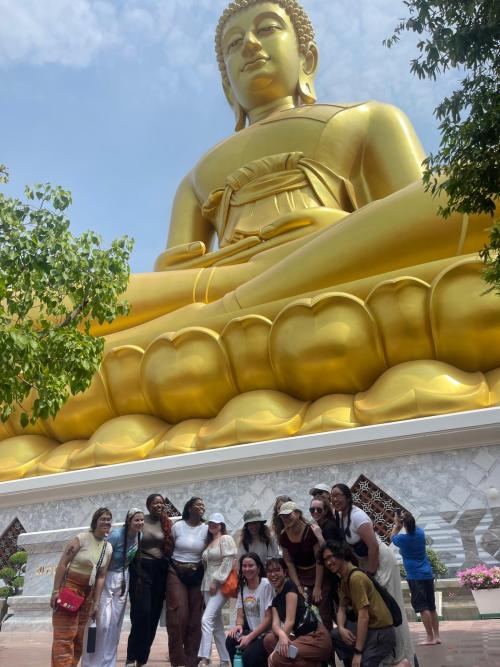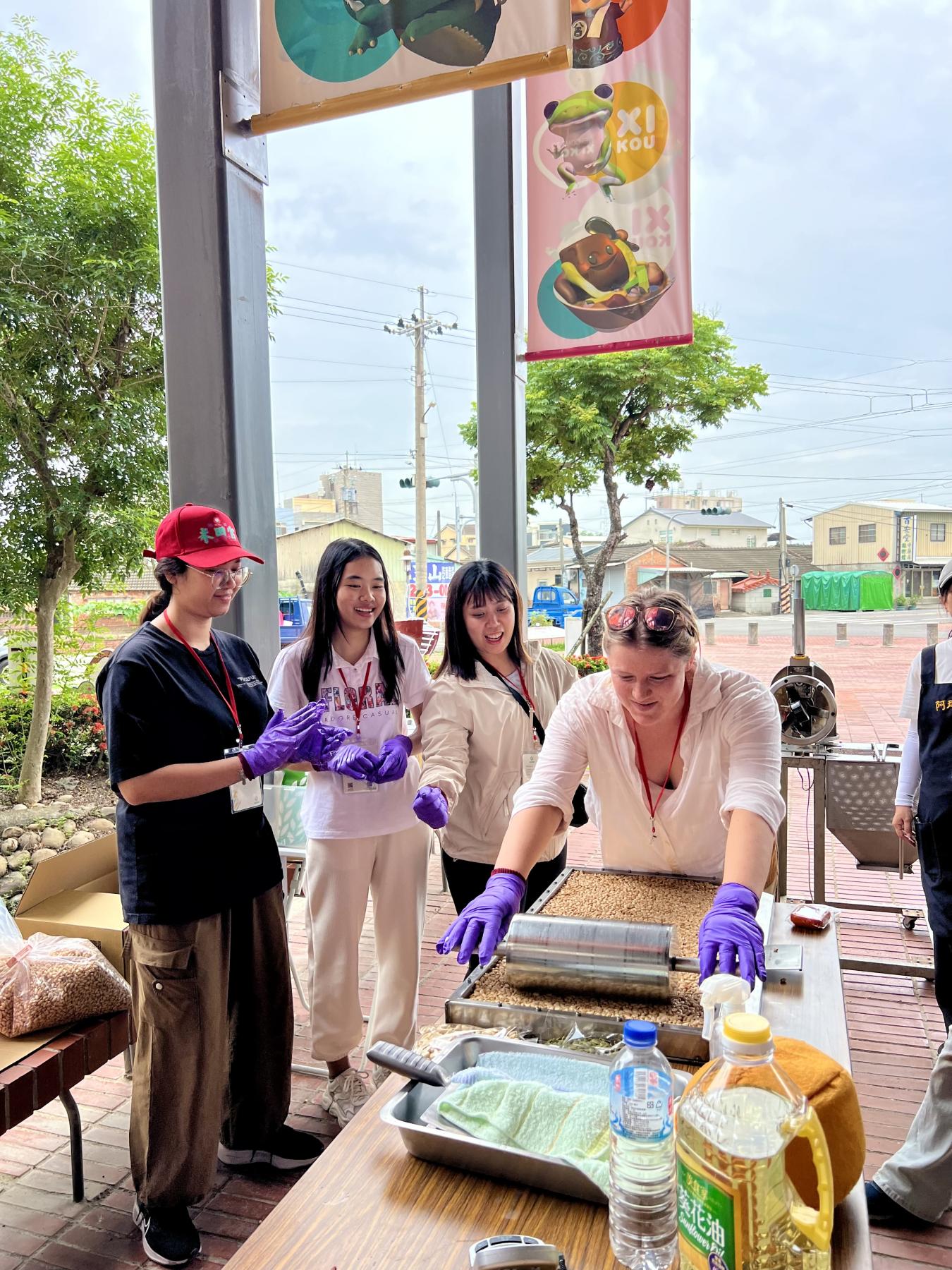Short-term Program and Immersion Opportunities: Academic Year 2025-2026
How to Apply
To apply please select Undergraduate Immersion Programs or Graduate Immersion Programs from the drop down menu below. The program title is hyperlinked, click the title to be directed to the program's online brochure and application page.
Short-term Program and Immersion General Application
If the program you are interested in is not currently accepting applications, please click here to complete a General Interest Application and indicate what program you are interested in and an advisor will inform you when the program opens. When prompted please select the "Log in with Campus ID" button on the left and use your MyUSF credentials.
Application Deadlines
Intersession: November 7, 2025 - Extended deadline: November 21, 2025
Spring Break: November 25, 2025
Summer: February 16, 2026 - Extended deadline: February 28, 2026
We recommend you start your application early (at least 3-4 weeks in advance of the deadline). Program applications must be fully complete by the deadline, students with incomplete applications are not permitted to travel on short-term immersion programs.


Upcoming Info Sessions
Global Immersions Info Sessions
- Tuesday, November 4 at 11:30 am - 12:45 pm
Learn more about our upcoming global immersions taking place in intersession, spring break and summer. These are faculty led programs taking place in locations such as Ireland, Italy, and Alaska and you can get class credit for your time abroad.
Global Immersions Tabling
- Wednesday, November 12 at 1:30pm - 2:30pm - Lo Schiavo
Want to study abroad without a full-semester commitment? Learn all about our Short-Term Global Immersions at our table, where you can earn class credit on faculty-led trips to destinations like Ireland, Italy, and Alaska during intersession, spring break, and summer!
Intersession 2026
Civil Rights, Justice, and Sport in Ireland - Dublin and donegal, Ireland - CAS Faculty: Shannon Siegel
PROGRAM DATES: JANUARY 4, 2026 - JANUARY 15, 2026
This immersion the delves into the topic of indigenous sport, as well as social justice and access to health care. Lectures and field trips on Civil Rights, Social Justice, and the incorporation of community service are all included in the program, and appeal to the USF student body as a whole. Students will also visit Northern Ireland and experience the roles that art and sport and dance have filled in providing access to social justice and where they have used sport to reconcile and implement social change.
Spring Break 2026
BASE Black Heritage Immersion to Southern USA - Southern USA - Faculty/Staff: Emille Lawrence and LaShirine Howard
PROGRAM DATES: MARCH 11, 2026 - MARCH 21, 2026
The Black Heritage Immersion Experience, open to members of the Marshall-Riley Living Learning Community, allows students to delve deeply into some of the most poignant chapters of Black history in the U.S., including antebellum slavery, Reconstruction, Jim Crow, and the long Civil Rights Movement. This immersion provides first-hand exposure to various historic sites, memorials, and communities in Louisiana, Alabama, Tennessee, and Mississippi.
USF Family Business Academic Global Immersion in the Philippines - Manila, Philippines - SOM Faculty: Monika Hudson
PROGRAM DATES: march 12, 2026 - march 22, 2026
AGI-Family Businesses Immersion course is one of the School of Management’s Entrepreneurship & Innovation and International Business elective offerings that concurrently carries cultural diversity and community-engaged learning designations. This year, the combined USF, Ateneo and Javeriana cohort will build upon general family business theory and extend theory-to-practice through a combination of USF, Ateneo and Javeriana on-site and remote coursework and business/cultural immersion experiences with students, instructors and family-owned firms located in Manila, Philippines.
Summer 2026
Gastronomy and Culture in Italy - Florence, Italy - SOM Faculty: Amy Martin
PROGRAM DATES: JUNE 3, 2026 - JUNE 12, 2026
Through reading, reflection, conversation, and immersion of the senses, students will cultivate new perspectives and exercise creative thinking about food and its place in Italian culture and in the world. Particular emphasis will be placed on local food traditions and cultures to identify farming and production techniques. Further, emphasis on the significance of local holidays and customs, such as dining, will also be explored.
Culture and Environment - Sitka, Alaska - CAS Faculty: Kathleen Coll
program dates: July 26, 2026 - August 9, 2026
This field course in the island community of Sitka, Alaska examines the relationship between culture, community, and the environment. Students will learn about the region’s marine and terrestrial environments and their use by the indigenous Tlingit Indians (who today comprise a quarter of Sitka’s population) and by its non-Native residents. We will explore Tlingit and Western views of nature, stewardship, and conservation. The course will also examine current controversies surrounding the use of the area’s natural resources -- its fish, timber, and natural beauty. The latter includes the impact of large-scale cruise ship tourism on Sitka. Wherever possible the emphasis is hands-on, experiential learning. *February 28th Application Deadline*
Greenville Community Design and Rebuild - Greenville, California - CAS Faculty: Seth Wachtel and Ross Mccarthy
program dates: tba
The Architecture Outreach Immersion: Greenville Community Design & Re-Build program is a hands-on, community-engaged initiative set in Greenville, CA, a town severely impacted by the 2021 Dixie Fire. The program focuses on collaborating with local residents, Maidu cultural representatives, and community organizations to design and construct an architectural project that supports the community’s rebuilding and cultural preservation efforts.
Intersession 2026
The X Games: Fan Experience and Event Management - Aspen, Colorado - Faculty: R. Douglas Manning
program dates: January 21, 2026 - January 26, 2026
Framed around the overarching theme of Fan Experience through Guest Services, students will examine how a multi-day, multi-sport festival integrate elective uses the X Games (Aspen, CO) as a dynamic case study to apply sport event management principles. Further, students will analyze how the X Games’ unique sense of place, counter-culture roots, and brand identity create authentic fan connections and commercial success.
Spring Break 2026
Global Sport Management Immersion Week: Australia - Gold Coast and Melbourne, Australia - CAS Faculty: Ashley Sloper
program dates: march 14, 2026 - march 26, 2026
The purpose of this March 2026 course is to immerse students in the economic and social context of the business of sport in Australia. Through a range of experiences, engagements, reflections and actions, students will gain a rich understanding of the dynamics of competing in this global sport management environment. Specifically, this 11-day study abroad program will include observational and experiential visits to sport teams, facilities, broadcasters, agencies and sponsors, presentations by sport management leaders, service-learning opportunities with local sport-based development organizations, and classroom-based debates and debriefs - all supported by a set of relevant reading materials and resources.
Disruptive Innovations in Mobility & Clean Tech - Belgium & Netherlands - SOM Faculty: William Riggs
program dates: march 14, 2026 - march 21, 2026
This AGI will focus on two countries that have been working to build new systems for clean tech / energy, transportation, and financial infrastructure. In this context this STEM-oriented course will work with clients to ideate new strategies for market growth particularly in the clean tech and clean transportation sectors. Using work from strategy sessions with clients, students assimilate information and transform knowledge providing a consolidated report that further ideates the engineering and business models for the future of public and private sector innovations in the target sectors.
Summer 2026
AGI Bio-Entrepreneurship in China- Shenzhen, Beijing - CAS Faculty: Cary Lai
program dates: may 24, 2026 - May 31, 2026
This AGI is intended to give students a sense of biotechnology enterprise in China, comprehending the mission and people of the major organizations which affect all elements of science and technology-based businesses, as well as its relation to the global biotech industry. During the visit, meetings will be conducted with global and national organizations, local start-ups, trade organizations, and cultural institutions. The intention is to learn about the starting, funding, managing and supporting fledgling biotech start-ups, to develop an appreciation for mature industry organizations, and to gain further insight into the biotech business process, which starts at the lab bench and ends with the consumer. Cultural experiences are intended to enrich student understanding of the socioeconomic factors at work.
July|McGrath Graduate Fellowship - Siem Reap, Cambodia and Bangkok Thailand - Program Leader: Bob Just
program dates: TBA
The McGrath Graduate Fellowship Program selects graduate students to engage and grapple with a diversity of experiences and questions that challenge humanity and the earth we live on. Topics including gender, education, sustainability, pandemics, connectivity/ technology and access, equity and inclusion will provide a framework for USF graduate students to explore, investigate and develop skills and new ways of thinking toward the future. An experiential immersion will lay the foundation of the program experience through which Fellows will engage in a process of discernment and action guided by the Ignatian Pedagogical Paradigm (IPP).